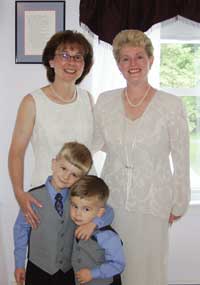Challenging and defeating the Defense of Marriage Act in front of the US Supreme Court is the next bold strategy by Gay & Lesbian Advocates & Defenders (GLAD).
| By GLAD DOMA Team | Contact  From left to right: GLAD Civil Rights Project Director Mary Bonauto directs the DOMA legal team. Mary was lead counsel in Goodridge v. Dept. of Public Health, the landmark 2003 case which resulted in Massachusetts becoming the first state in the nation to allow same sex couples to marry. She was also co-counsel in Kerrigan and Mock v. Dept. of Public Health, GLAD's 2008 marriage victory in Connecticut. Mary is joined by Gary Buseck, GLAD's Legal Director. An experienced litigator and legal strategist, Gary has worked in private practice in addition to serving as Legal Director for Lambda Legal. Other team members pictured include staff attorneys Janson Wu and Nima Eshghi, GLAD's public education staff, headed by Director of Public Affairs and Education Carisa Cunningham, and Executive Director Lee Swislow. Rounding out the team are cooperating law firms with specialized legal knowledge, including Social Security experts from Foley Hoag LLP, tax experts from Sullivan & Worcester LLP, and constitutional law and U.S. Supreme Court experts from Jenner & Block LLP.
| |
| | |
FEDERAL DISCRIMINATION
The federal government has always deferred to state law in determining marital status. Not so for same-sex couples. Instead of respecting the historic division of power relating to marriage recognition, the federal government has created a marriage policy that overrides the state's determination of who is married - but only for same-sex couples.
The federal Defense of Marriage Act (DOMA), passed by Congress in 1996, created this discrimination by excluding same-sex couples from the definition of marriage. DOMA defines "marriage" as between one man and one woman and "spouse" as only a person of the opposite sex. These limitations on who counts as married directly impact more than 1,138 federal laws and programs in which marital status is a factor, including:
> Social Security benefits related to disability, care of a minor child, retirement, and death;
> The right to take time off from work to care for a seriously ill spouse or child through the Family Medical Leave Act;
> The right to leave assets to your spouse - including the home you share together - without incurring a tax penalty;
> Joint tax filing and pooled deductions that can save families money;
> Access to all the benefits of a spouse's health plan, without a tax penalty;
> Retirement and death benefits for spouses of federal employees.
In effect, with DOMA, the federal government reaches into the state and divides legal marriages into first- and second-class relationships - those worthy of federal protections and those deemed unworthy.
DEFEATING THE DEFENSE OF MARRIAGE ACT (DOMA)
Eliminating this federal discrimination is a critical goal in the fight for full equality.
Just as GLAD planned and argued historic cases to end marriage discrimination in Massachusetts, Connecticut and Vermont, we are building a winning legal case against DOMA. Our legal team is targeting the most vulnerable federal programs. We have scouted and vetted plaintiffs representing the main issues and the diversity of our community. We have consulted political insiders and Supreme Court experts. Our public education team has crafted and tested key messages and identified the stories and families who show the harm DOMA inflicts on real people, every day.
GLAD will challenge only Section 3 of DOMA - the section that defines "marriage" and "spouse" and denies federal rights and benefits to same-sex couples. In court, our case will focus on equal protection principles, underscoring the lack of a legitimate federal interest in how DOMA divides married couples into two unequal classes. We will also highlight concerns about the proper role of states and the federal government in determining who is married. Finally, by targeting specific programs denied to married same-sex couples and obtaining a ruling that the discriminatory definition of "marriage" and "spouse" cannot be applied in those programs, we will deliver a focused - and, we believe, fatal - blow to federal discrimination across the board.
We are not challenging Section 2 of DOMA, which excuses states from any obligation to honor the marriages of same-sex couples from other states. We're simply asking the federal government to return to its traditional practice of respecting the validity of marriages licensed by the states.
WE CAN WIN
We wouldn't challenge DOMA if we didn't think we could win.
For more than three decades, GLAD has fought and won cases in state and federal court, including an historic victory at the United States Supreme Court. In the years since our landmark Goodridge win in Massachusetts we have won marriage in Connecticut, expanded our legal team and strengthened our partnerships locally and nationally. We have built our capacity for strategic public education. We have the support and shared expertise of legal, LGBT, and political leaders and organizations throughout the country.
Not only are we stronger, we know marriage. We've fought for marriage and won. We've defended marriage in the courts, the legislature, and the court of public opinion. We know the law, the policy issues, and the political challenges. And in Massachusetts we know the thousands of married couples who are hurt time and again by the federal government's persistent discrimination against their families.
OUR CHALLENGE
We expect to argue this case at the United States Supreme Court within the next four years. To move forward, we'll need to intensify our research, analysis, litigation, polling, and outreach work. Ongoing public relations efforts no doubt will need to anticipate and respond to right-wing attacks. Our plaintiffs will be held under a media microscope. And our case will be in the national spotlight.
We know the road ahead. And we know that to fund this extraordinary challenge - in which our adversary is the dauntingly resourced federal government-we must raise $6.5 million.
You have the chance to be a part of history by supporting this campaign.
 | | THE COUPLE NEXT DOOR By night, Mary and Kathy may seem like typical suburban moms, cooking dinner and checking homework for their boys while navigating a maze of Legos and basketballs. By day they are both engaged members of their community. A stay-at-home mom who sits on the PTO executive board, Kathy is deeply involved in her boys' education, reading in their classrooms and coordinating book fairs to help their grade school raise money. Mary, a state police officer for more than two decades, collects and analyzes evidence at crime scenes. Mary and Kathy have been together for nearly 20 years and are legally married. But they are denied access to the safety net the government provides for officers' families. If Mary were killed in the line of duty, Kathy would not receive the benefit the government pays to deceased officers' spouses. Mary risks her own safety to protect her community, but Kathy doesn't have the same peace of mind as other officers' spouses. And Kathy wouldn't be eligible for the education benefit for surviving spouses, something she would likely need to re-enter the workplace. Kathy would like to return to work when the kids are older. If she stays on Mary's health insurance, she will have to pay taxes on its value - taxes her married neighbors don't pay. And unlike other married couples, Mary and Kathy cannot save money by filing their federal taxes jointly - money they could use for everyday expenses or to put aside for the boys' college funds. Mary and Kathy are denied these critical rights and protections that other married couples depend upon - rights and protections that could add up to a more secure future for them and their boys. Because unlike their straight married neighbors in Massachusetts and Connecticut, federal law excludes legally married same-sex couples from the biggest programs our government offers to support and protect families. It's just not fair. | |